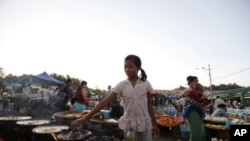While Burma gains notice for its pro-democratic political reforms, efforts to boost economic development have been slower. Rising consumer prices are testing the public’s patience and hopes for change.
Burma’s economy was once at the top in Southeast Asia, but after decades of mismanagement by military rulers, now one third of its 60 million citizens live in poverty.
Authorities in the resource-rich nation are eager to revive the economy and take advantage of their location next to the Asian powerhouses China and India.
But analysts such as Sean Turnell at Sydney's Macquarie University say some conservatives in the government are resisting deregulation.
“The big foundational reforms, the things that the country really needs, changing the exchange rate, bringing in much more alliance in terms of sound property rights regimes and rule of law, etc.," said turnell. "Those sort of really big ticket items, the really important stuff, have really yet to be embarked upon.”
The government last year broke up some monopolies for importing cars and trading cooking oil. It also reduced export taxes and eliminated income tax requirements for citizens living abroad. Select private banks are, for the first time, allowed to trade in foreign currencies.
Economists say even more must be done, but politicians appear reluctant.
“Most of us expected political reform because we have been under political control for a very long time," said Khin Maung Nyo, a retired official turned freelance economist in Rangoon. "And, another thing is in terms of economic reform we need to have more knowledge or wisdom, or assessment, or judgment, to make economic reforms.”
Economists warn inflation could also risk upsetting reform efforts.
On Sunday, authorities raised gas prices by 30 percent without warning. A similar unexpected price hike in 2007 sparked protests that later grew into an anti-government movement.
Turnell says although there is still a risk of social unrest if prices get out of control, the reform environment is making people feel optimistic about the future.
“Burma’s inflation rate has always been problematic. And, it is much higher than any other country in ASEAN, for instance," added Turnell. "So, it is always there as a problem. To some extent that was alleviated or has been alleviated a little bit over the last year or so because of the rising value of Burma’s currency, the kyat. So, that in a sense has protected some of the purchasing power, at least for people who are able to buy goods that are imported from Thailand and China and other places.”
While economists agree that people in Burma are somewhat resilient to upswings in costs, Khin Maung Nyo says authorities raised high expectations among the public for economic reforms.
“Without any improvement in economic development, we, our new government might lose economic legitimacy," said Khin. "So, it is a need and it is a must. Without any remarkable development in economics, they will suffer.”
Khin says U.S. and European economic sanctions against Burma are limiting its access to global trade and technology and should be lifted. Other economists argue the punitive measures should be gradually lifted as a reward in step with Burma’s reforms.
Despite the internal resistance to reform, Burma’s new government is seeking outside help from the International Monetary Fund and the World Bank.
















